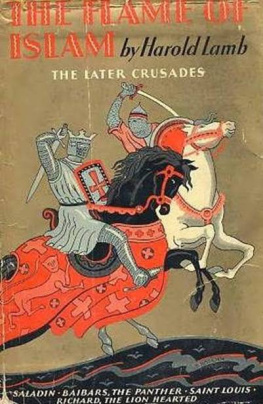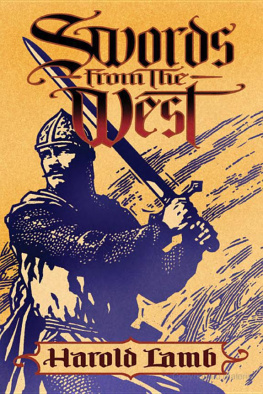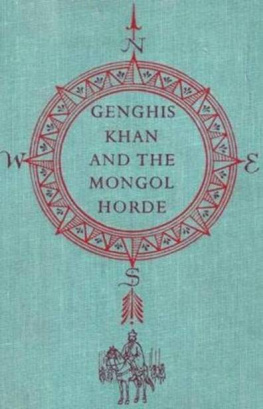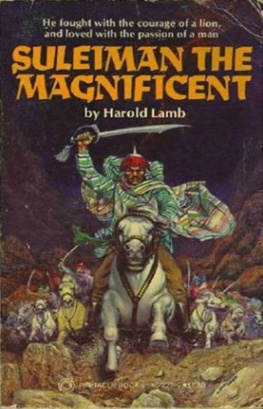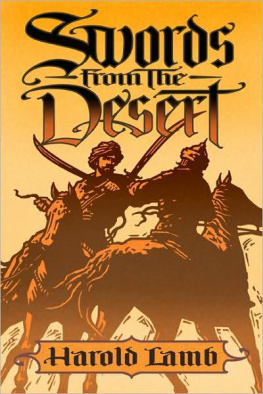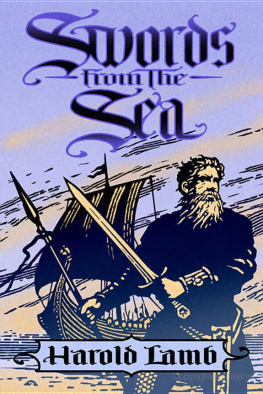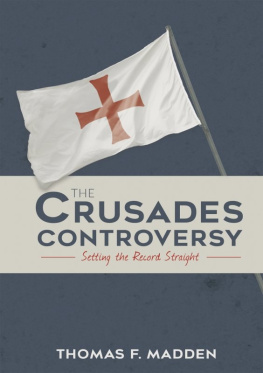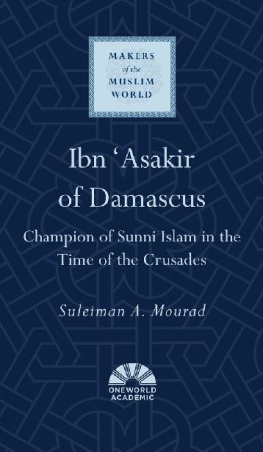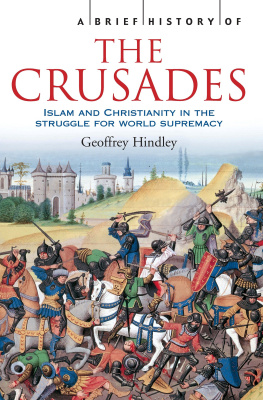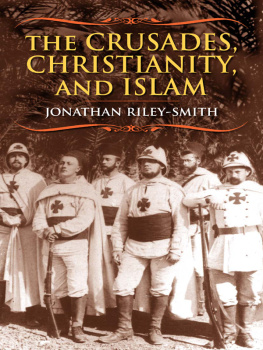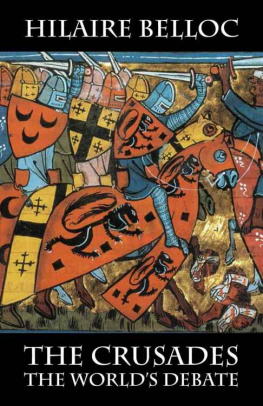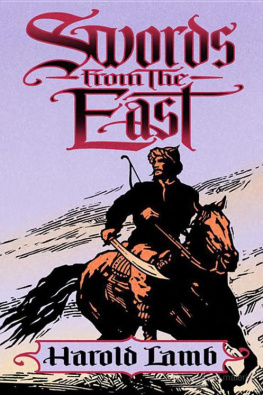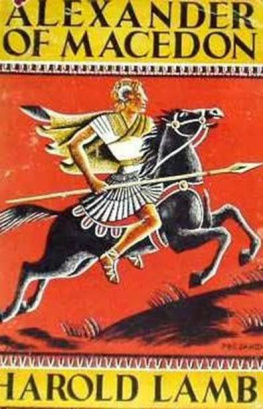Harold Lamb - The Crusades: The Flame of Islam
Here you can read online Harold Lamb - The Crusades: The Flame of Islam full text of the book (entire story) in english for free. Download pdf and epub, get meaning, cover and reviews about this ebook. year: 1987, publisher: Third World Book Shop, genre: Adventure. Description of the work, (preface) as well as reviews are available. Best literature library LitArk.com created for fans of good reading and offers a wide selection of genres:
Romance novel
Science fiction
Adventure
Detective
Science
History
Home and family
Prose
Art
Politics
Computer
Non-fiction
Religion
Business
Children
Humor
Choose a favorite category and find really read worthwhile books. Enjoy immersion in the world of imagination, feel the emotions of the characters or learn something new for yourself, make an fascinating discovery.
- Book:The Crusades: The Flame of Islam
- Author:
- Publisher:Third World Book Shop
- Genre:
- Year:1987
- Rating:5 / 5
- Favourites:Add to favourites
- Your mark:
- 100
- 1
- 2
- 3
- 4
- 5
The Crusades: The Flame of Islam: summary, description and annotation
We offer to read an annotation, description, summary or preface (depends on what the author of the book "The Crusades: The Flame of Islam" wrote himself). If you haven't found the necessary information about the book — write in the comments, we will try to find it.
The Crusades: The Flame of Islam — read online for free the complete book (whole text) full work
Below is the text of the book, divided by pages. System saving the place of the last page read, allows you to conveniently read the book "The Crusades: The Flame of Islam" online for free, without having to search again every time where you left off. Put a bookmark, and you can go to the page where you finished reading at any time.
Font size:
Interval:
Bookmark:
His army was almost intact, the men eager to be led on. Elsewhere the Christian strongholds were just beginning to hear the terrible tidings of Hattin, More than that, the great citadels were now held only by skeleton garrisons. Their feudal lords almost without exception had been slain or taken at Hattin, Saladin wasted not a day in deliberation. He brought his army down to the coast, thus cutting the lands of the crusaders in twain separating north from south. He struck first at the strongest of the coast ports, Acre. With what siege engines he had been able to carry on camel and mule back, he prepared to attack the walls; but Acre, with only a handful of soldiers, opened its gates and the sultan was well pleased to grant it generous terms.
Then he divided his host since no army could possibly be mustered to threaten the Moslems and sent the divisions headlong over the country, under Al Adil, Taki ad Din, and the other amirs. He himself cleared the mid-region between Acre and Galilee, taking possession of Haifa, Saffuriya, Nazareth, and Caesarea to the south. Then he moved north, and took the surrender of lofty Tibnin, while his advance was preparing the siege of Beirut, at the foot of the red hills of Lebanon. Sidon yielded to a passing summons, and Beiruta walled city without a fortress surrendered after an eight days siege.
Swiftly Saladin detached garrisons to hold the captured places. The people of the towns he let go where they willed. Without their fortresses the bulk of the Christians were helpless, under the swords of his horsemen. His soldiers snatched up all provisions and weapons and precious goods, but the sultan would not delay for any seeking of spoil. He wanted to add Tyre, lying behind its walls out in the sea itself, to his conquests, but Jerusalem was his goal, and thither he went on the heels of Malik Adil, who had stormed Jaffa. Tyre could be attended to later.
By the last of July, Saladin was camped in the sands before the great wall of Ascalon, which had refused to surrender. Ascalon, sheltered behind its twelve-foot curtains and square towers, was the main port of the south, as Acre had been of the center of the Holy Land. From it ran the caravan route to Egypt, The Moslems called it the Bride of Syria, and Saladin would not leave it unconquered. While he prepared to besiege it, he sent for Guy of Lusignan, who had been its lord.
When the captive king appeared, the sultan offered to release him if he secured the surrender of the city, Guy was led under the wall to talk to the garrison, but could not prevail upon the defenders to open their gates. So the Moslems drew the siege lines tighter, and sent detachments to subdue the country between there and Jerusalem.
Here the Christians still lingered in the little hill towns, by their shrines and churches all of them who had not taken refuge in Jerusalem. Down by the sea Gaza and Darum yielded to the sultans summons. Defense was hopeless, and Ramlah gave up its keys, while the Moslem banners were carried into the church over the tomb of St. George.
Within the foothills, the strong castle of Ibelin surrendered after bargaining for the release of its beloved lord, young Balian. Almost within sight of Jerusalem, the towns of the monks yielded Bait-Jebrail, and Bait-Laim, that the crusaders called Bethlehem. And, isolated, without hope of aid, Ascalon asked for terms on the fourth of September.
In two months Saladin had swept through the whole of the Holy Land that had taken the crusaders so many generations of effort and bloodshed to subdue. True, in the east several of the giants of the frontier still remained intact on their heights. But the Moslems held all the country behind them, and, cut off from the sea, their fate was only a matter of time. They were summits that had escaped the sweep of the flood and the men isolated within them could not venture out.
And Saladins thoughts were bent on Jerusalem, where lay the Al Aksa, the third sacred place of Islam, and the gray rock from which Muhammad had ascended. Jerusalem would be the fruit of his conquest the true reward of the almost unbelievable good fortune that had befallen him. On the twentieth of September his army camped on the western height opposite the Gate of David.
A few days before, Balian dIbelin had reined his horse through the same gate. The young baron found himself the only noble within the city of all those who had gone forth to HattinThe queen, Sibyl, waited there in the palace, with her sister Isabeltheir quarrel forgotten in the calamity of the kingdom. There too waited Heraclius and the abbots of lost churches, with the refugees from a dozen towns. But no knight skilled in arms until Balian came.
Anxious women thronged the narrow streets. Cattle crowded the fields by the Butchery. Mules and led horses filled the chambers under the Templars quarters, where the chargers had been. Boys, gray priests, and Syrian Christians long-robed merchants, haggard pilgrims, and voiceless widows waited in the courtyard of the Sepulcher, while prayers were uttered ceaselessly. Only a scattering of armed men gathered on the tower summits, or walked moodily through the alleys.
And they all besought Balian to take command of the defense. They had not seen the red fields of Hattm. Their thoughts could not grasp the reality that the armed host did not exist any more. In some way a miracle would aid them, and Jerusalem would not be taken from them, Balian dIbelin must show them how to defend the city!
He told them that he was no more than a prisoner released on his oath never to bear arms against the sultan. He showed them that he wore no sword. They pressed around him, and would not leave him, and in the end he yielded to them, A knight, raised to arms, could not stand apart while common people fought.
All this he wrote in a despairing letter to Saladin, asking in the same moment that the sultan would seek out and safeguard his wife and children. In time the answer came that Saladin understood and would protect his family.
Meanwhile Balian did what he could. He assembled the few score men trained in arms. He knighted, without ceremony, some fifty youthful esquires and sergeants. With the money of the churches he bought pikes and crossbows and shields for the hundreds of peasants and pilgrims who were able to handle them. He knew well enough that no miracle would save the city by aid of such men, but he had cast in his lot with them, and he did what he could, At least Jerusalem would not fall without a blow struck.
Meanwhile Saladin and his amirs had studied the western wall, and found it too strong to be assailed. As the first crusaders had done, eighty and eight years before, he moved his camp to the high ground opposite the northeast angle of the city. Here the siege engines were set up, and a barricade raised along the ditch to protect the miners who set to work to dig under the foundations of the wall.
The unskilled garrison had no proper engines to break down the barricade, and their counter-mines fell in. They manned the summit of the wall and plied their bows, but the veteran mamluks and Turks made no attempt at first to storm the gray stone rampart. Instead, the miners enlarged their tunnels, propping up the foundation of the city wall as they dug beneath it until the props were burned and a broad section of the wall cracked and fell in.
For this moment the Moslem swordsmen had waited, and while the drums roared they swarmed up into the breach, to be met by arrows and slingstones and javelins.
I will take Jerusalem as the Christians took it, Saladin had said, sword in hand.
The Moslems gained the breach and held it, fortifying it for their next effort. And that night a kind of miracle happened. While the priests and women marched in procession through the streets chanting the Miserere, the armed men, led by the knights, surged out, with the battle cry of the cross.
Font size:
Interval:
Bookmark:
Similar books «The Crusades: The Flame of Islam»
Look at similar books to The Crusades: The Flame of Islam. We have selected literature similar in name and meaning in the hope of providing readers with more options to find new, interesting, not yet read works.
Discussion, reviews of the book The Crusades: The Flame of Islam and just readers' own opinions. Leave your comments, write what you think about the work, its meaning or the main characters. Specify what exactly you liked and what you didn't like, and why you think so.

